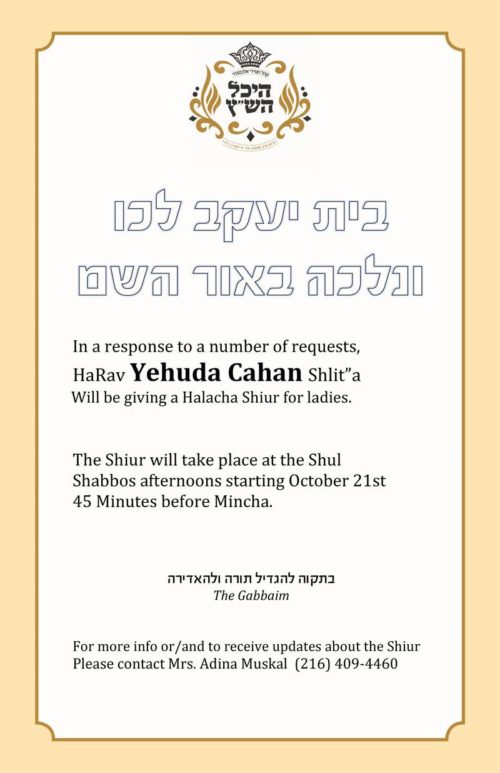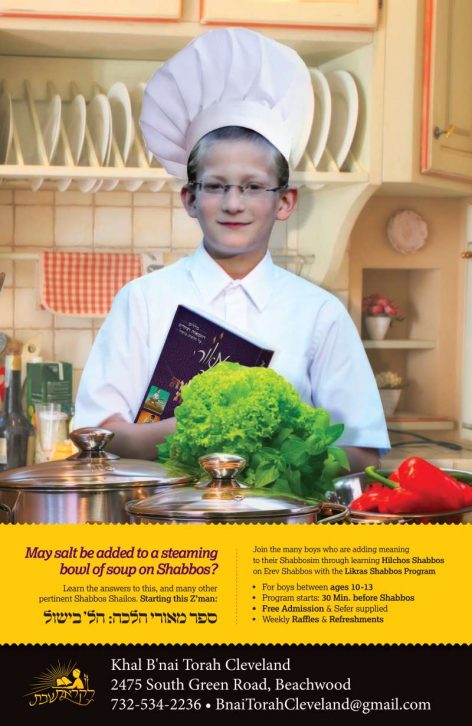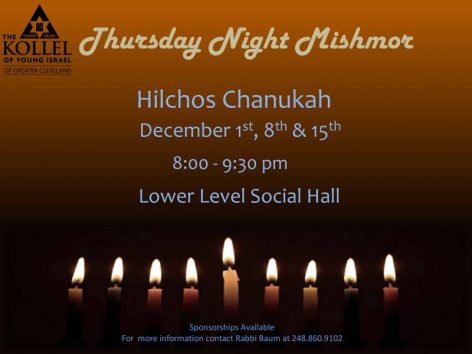Weekly Hilchos Shabbos Program for Boys, Erev Shabbos at Khal B’nai Torah
Likras Shabbos weekly boys halacha program is restarting. It will be held downstairs at Yavne, Kehilas B’nai Torah. This zman the halachos being covered are zoreh, borer, and meraked.
New Women’s Halachah Shiur With Rabbi Cahan Starting this Shabbos
Special Shiur on Halachos of Employer/Employee Relationship by Rav Ari Marburger, Monday, Labor Day
Monday, September 4, the Choshen Mishpot Chaburah (located in Torah Life Kollel, Cleveland Heights) will be hosting a short shiur on the Halachos of Schirus Poalim (Employer/Employee relations). It will be given by Rav Ari Marburger, Dayan, Bais Din Maysharim, and author of “Business Halacha” (Artscroll). It will be at 3pm at Torah Life Kollel.
Exciting Weekly Hilchos Shabbos Program for Boys, Erev Shabbos at Khal B’nai Torah
Thursday Night Mishmor: Hilchos Chanukah – at Kollel of YIGC
In an Unprecedented Move, Jewish Federation of Cleveland Takes a Public Position on an Abortion-related Issue
Urges Governor Kasich to veto the pending heartbeat abortion ban bill.
Federation’s full public statement:
Act Now: Veto the Fetal Heartbeat Bill
Action Alert
Join the Federation in opposing the enactment of the Fetal Heartbeat Bill in Ohio, which would ban almost all abortions after a fetal heartbeat is detected (about six weeks following conception). Though historically, the Jewish Federation of Cleveland has not taken a stance on reproductive policy, in light of the extreme nature of the Fetal Heartbeat Bill, we are compelled to oppose the bill. This bill imposes excessive restrictions that would strictly limit a woman’s right to obtain an abortion, even under circumstances resulting from mental health, and improperly ignores religious concerns. It takes medical decisions out of the hands of doctors by criminalizing those medical practitioners who perform procedures outside the narrow prescriptions of the bill.
If signed into law by Governor Kasich, Ohio would have the most restrictive abortion bill in the nation. According to legal experts, the law likely will be ruled unconstitutional.
Call Governor Kasich today at 614-466-3555 to make your opposition known.
Stephen H. Hoffman, President
Gary L. Gross, Board Chair
Cheryl Davis, Community Relations Committee Chair
In a patch.com article, the background on the Federation’s position is explained: The Federation has never before issued a statement about abortion, but felt this new bill would threaten Jewish religious freedom (patch.com).
Chavie (Jessica) Cohen, Managing Director of the Community Relations Committee at the Jewish Federation of Cleveland, who is quoted in the Patch article, added the following for Local Jewish News readers.
The impetus to us issuing this statement was the lack of religious exemption in this bill. As it was passed, the bill does not allow a Rabbi’s ruling to supersede the law in that rare case where necessary, and so restricts the religious freedoms of Orthodox and other practicing Jews. For this reason, the Jewish Federation of Cleveland developed this statement.
Also, this is the first time the Federation has ever spoken out on the position of abortion. That’s specifically because the Federation takes its responsibility to represent the entire Jewish community very seriously – including the views and positions of the Orthodox community. In this case, the lack of religious exemption speaks directly to us as a Jewish community and we were compelled to issue the statement.
Rabbi Yitz Frank, Ohio Director Agudath Israel of America, said “It is a complicated issue from a halachic perspective” and provided the following letter for Local Jewish News readers. (It was provided last year to members of the general assembly when the issue was originally being debated.)
Agudath Israel of America on Abortion:
October 20, 2015
Agudath Israel of America on Abortion
Jewish tradition teaches that all human life is sacred and a human fetus has status and dignity. Termination of pregnancy therefore raises profound moral concerns. Agudath Israel of America has long opposed the central holding of Roe v. Wade, that the right to abortion protected under the Fourteenth Amendment’s personal liberty/due process clause is uniformly “fundamental,” and thereby protected against governmental abridgment absent a compelling state interest.
At the same time, as a representative of a religious minority community whose constituents rely heavily on the religious freedoms guaranteed under the First Amendment, Agudath Israel is a staunch advocate of religious liberty for all Americans. As a general rule, Judaism rejects the notion that termination of pregnancy, even prior to fetal viability, is properly a matter of free maternal choice. Nonetheless, in certain exceptional cases, Jewish law may authorize abortion, indeed, may require abortion as a matter of religious obligation. Accordingly, in conjunction with its opposition to legalized abortion on demand, Agudath Israel has supported a woman’s legal right to abortion where she seeks the abortion as an expression of her religious faith.
The central premise of Agudath Israel’s position is that characterization of the right to abortion as “fundamental” need not be a matter of always or never. In most cases, where the sole constitutional source of the claimed right to abortion is the personal liberty/privacy right developed in Roe v. Wade, the right to abortion should not be accorded the status of a “fundamental” right. Accordingly, legislative measures designed to restrict the availability of abortion should generally be upheld even in the absence of any compelling state interest, so long as there is a rational basis for the legislation.
There are times though when a woman’s claimed right to an abortion is grounded not only in her personal liberty/privacy right, but also in another constitutionally protected interest. For example, for a state to deprive a woman the right to an abortion even where continuing a pregnancy threatens her life, it is not merely to deprive her of some vague sense of a personal liberty “interest”; it is literally to deprive her of the “life” the Fourteenth Amendment expressly protects. Surely a strong case can be made that abortion in such cases is a right that is “fundamental”.
Additionally, when abortion is an expression of the mother’s religious beliefs, her constitutional claim is enhanced by her right to freely exercise her religion. In such cases, access to abortion is indeed a right that is “fundamental,” and may not be abridged, absent a countervailing compelling state interest.
We commend your efforts to protect the sanctity of life. However, in the context of the present legislation, we respectfully ask that an exception be made when an abortion is an expression of the mother’s sincerely held religious belief. For practitioners of the Jewish faith that would include where the pregnancy poses a risk to the life of the mother, and perhaps even if it poses a grave danger to her physical or mental health. We ask that you not force citizens to choose between following their religion and complying with the law. Thank you for your understanding and consideration.
Exciting Weekly Hilchos Shabbos Program for Boys, Erev Shabbos at Khal B’nai Torah
Nine and a Child By Rabbi Yirmiyohu Kaganoff
(RabbiKaganoff.com)
Question #1: Nine and a Chumash?
“A friend of mine once moved to a community where the local daily minyan was not that reliable. On a regular basis, services were conducted by having a ten-year old hold a chumash as the tenth man. Is there a basis for this practice?”
Question #2: Studying Chumash
“When the rishonim referred to a chumash, what did they mean? After all, they lived before the invention of the printing press.”
Hodu — Our Daily Thanks By Rabbi Yirmiyohu Kaganoff
(RabbiKaganoff.com)
The Daily Hodu Prayer
Question #1: “Why does Nusach Ashkenaz recite Baruch She’amar before Hodu, whereas Nusach Sfard recites Hodu first?”
Question #2: “I noticed that there are sections of Tehillim that are very similar to Hodu. Why are there noticeable differences between these parts of Tehillim andHodu?”
Question #3: “The Hodu that is in the book of Tehillim is divided between two chapters, Chapters 105 and 96. Why do we combine them when we daven?”
The Gadol of Sochatchov-Baltimore Rav Michael Forschleger By Rabbi Yirmiyohu Kaganoff
(RabbiKaganoff.com)
Question #1: How was a chassidishe gadol instrumental in creating one of the most prominent Litvishe yeshivos?
Question #2: How did the same gadol make his parnasah during the Great Depression?
Question #3: Who was Rav Gifter’s first rebbe, someone with whom he kept an active correspondence for almost thirty years?
Eating before Kiddush By Rabbi Yirmiyohu Kaganoff
(RabbiKaganoff.com)
Question #1: Reuven calls me: I have not been well, and I need to eat something shortly after awaking. On weekdays, I davenshortly after I wake up and then eat immediately afterwards, but there is no available minyan for me to attend early Shabbosmorning. What should I do?
[Read more…]
Sukkah Schach Review By Rabbi Yirmiyohu Kaganoff
(RabbiKaganoff.com)
Question #1: “What are the potential halachic issues encountered with schach mats?”
Question #2: “My aunt, who always takes the family out to eat when she visits, will be in town for Sukkos, and knows that her favorite restaurant has a sukkah forChol Hamoed. Can we rely on the restaurant’s sukkah?”
Between Yishtabach and Borchu By Rabbi Yirmiyohu Kaganoff
(RabbiKaganoff.com)
There are numerous references in this week’s parsha, Ki Savo, to blessings, praises and thanksgivings to Hashem. This provides excellent opportunity to discuss thebrocha of Yishtabach and the Kaddish and Borchu that follow.
Question #1: Between Yishtabach and Kaddish
Avraham asks: “In the shullen in which I used to daven, during the aseres yemei teshuvah we always recited the chapter of tehillim, “Shir hama’alosmima’amakim,” right after Yishtabach. Someone recently told me that the reason why I do not see this custom practiced any more is because it is a hefsek in thedavening. Is this true?”
Halachos of The Three Weeks
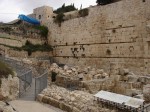 HaRav Yisroel Dov Webster, Shlita, noted Posek, Dayan–Shaarei Mishpat, and author of The Halachos of Pregnancy and Childbirth, gives a Hakhel Halacha Shiur in Boro Park. We provide below a review by Rabbi Webster of the Halachos of The Three Weeks, which begins today. As with all Halachos, in case of one’s particular circumstances, he/she should consult with their own Rav or Posek:
HaRav Yisroel Dov Webster, Shlita, noted Posek, Dayan–Shaarei Mishpat, and author of The Halachos of Pregnancy and Childbirth, gives a Hakhel Halacha Shiur in Boro Park. We provide below a review by Rabbi Webster of the Halachos of The Three Weeks, which begins today. As with all Halachos, in case of one’s particular circumstances, he/she should consult with their own Rav or Posek:
Complex Clearings or Removing Muktzah from the Table By Rabbi Yirmiyohu Kaganoff
(RabbiKaganoff.com)
It is Mrs. Friedman’s* unmistakable and excitable voice on the phone. “Rabbi,” she begins in her trademark high pitch, “I am married almost twenty years, and have been clearing my Shabbos table the same way all these years: I brush the small items off the tablecloth and pick up the large ones. Last week, a guest, Aviva, politely suggested that I ask my rabbi whether I am doing this correctly. She was taught that she may not remove pistachio shells and used napkins by hand; instead, to place a disposable clear cover on the tablecloth before setting the table, and after clearing the dirty dishes at the end of the meal, to simply roll up the plastic.
The Lost Gift By Rabbi Yirmiyohu Kaganoff
(RabbiKaganoff.com)
In this parshas Mishpatim, the Torah discuss the responsibility that a shomer assumes for someone else’s property. Does a shomer always assume this much responsibility? Stay tuned and find out!!!
While learning in my study one day, I was greeted by a knock at the door. I opened the door to find two women, Rivkah and Leah, standing in the doorway.
Do People Live in a Zoo? By Rabbi Kaganoff – Halachos of Carrying – Parts 1 and 2
Question #1: Checking inside the eruv
“Can the eruv fences, walls, and wires be checked religiously every week, yet the eruv is invalid?”
Question #2: Shabbos in a warehouse
“May one carry in a warehouse on Shabbos?”
Question #3: Do people live in the zoo?
What do the previous two questions have to do with the title of this article?
Tips on Checking Selected Dried Fruits and Nuts
(Hakhel)
With Tu B’Shevat less than a week away, we move into thoughts of preparation for a Rosh Hashana not known to the world at large. We provide below a guide sourced from reliable hashgacha agencies. We note that with respect to fresh figs, we have been advised that they are a top concern, as they can be infested with tolaim. We also add that we have been advised that there is no issues of tolaim with respect to pomegranates. As always, one should consult with his own Rav or Posek for a final p’sak in all matters.
HOW TO CHECK DRIED FRUIT/ NUTS
Making Kiddush On Schnapps – By Reb Binyomin Radner
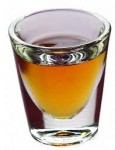 Is one allowed to make Kiddush on schnapps or does it have to be on wine? If yes, does one need a reviis as with wine, or does the regular required shiur of reviis which is between 3.3-4.5 ounces, decrease in honor of making kiddush on schnapps? Does it decrease from a reviis to the amount of one ounce ordinarily contained in a shot-glass?
Is one allowed to make Kiddush on schnapps or does it have to be on wine? If yes, does one need a reviis as with wine, or does the regular required shiur of reviis which is between 3.3-4.5 ounces, decrease in honor of making kiddush on schnapps? Does it decrease from a reviis to the amount of one ounce ordinarily contained in a shot-glass?
The answer to this question just like the answer to every other question in Halacha is, “It’s a machlokes!”
Gemara, Nazir 4A – Kiddush is dioraysa, but making it on wine is only midirabanan as you can also make it on bread. Kiddush at night is midioraysa, by day is midirabanan.
Who is the True Redeemer? By Rabbi Yirmiyohu Kaganoff
(RabbiKaganoff.com)
Question #1: Deadbeat dad
Mrs. Gerusha* calls me with the following question:
“I am a divorced baalas teshuvah with two young children, a son and a daughter. My son never had a pidyon haben, and my ex-husband is an agnostic who is not interested in participating. Am I required to perform the pidyon haben for my twelve-year-old son, and what is the procedure if I do?”
What is an Otzar Beis Din, and is it Good for the Jews? By Rabbi Yirmiyohu Kaganoff
(RabbiKaganoff.com)
Well, what do the words “Otzar Beis Din” mean? And, as an old friend of mine would ask, “Is an Otzar Beis Din good for the Jews or bad for the Jews?”
Literally, the words mean “a storehouse operated by Beis Din.” Why would Beis Din operate a warehouse? Is this some type of gmach or warehouse for impounded goods? Or a place where Beis Din stores people who are recalcitrant to follow its rulings? Although these might be good ideas, they have nothing to do with anOtzar Beis Din, which is a halachically approved method of distributing shmittah produce.
Before explaining what is an Otzar Beis Din, we must first review briefly the halachos of shmittah. These rules fall under two general categories:
The Heter Mechirah Controversy By Rabbi Yirmiyohu Kaganoff
(RabbiKaganoff.com)
Several shmittah cycles ago I was working as a mashgiach for a properly-run American hechsher. One factory that I supervised used to manufacture breading and muffin mixes. This company was extremely careful about checking its incoming ingredients: George, the receiving clerk who also managed the warehouse, kept a careful list of what products he was to allow into the plant and what kosher symbols were acceptable.
P’sakim of HaRav Shmuel Kamenetsky, Shlita on Hilchos Chanukah
(Hakhel)
We provide the following p’sakim of HaRav Shmuel Kamenetsky, Shlita, as excerpted from the Sefer Koveitz Halachos by Rabbi Doniel Kleinman, Shlita. As with all Halacha, one should ask his own Rav or Posek for a definitive ruling in his particular case or situation:
1. Although one may not use a combination of oil and candles for his Neiros, one may use different oils on any given night, because they are considered similar enough to each other.
2. One need not use the candle that was used as the candle to light the Neiros Chanukah as his Shamash.
3. Even if the glass cups which are inserted into a Menorah cannot stand on their own because of the narrow piece of glass that fits snugly into the Menorah, one can consider the cup to still be a Kli–for it is specifically manufactured to be used in this way.
Rav Yehudah Hachassid and his Shidduchin II By Rabbi Yirmiyohu Kaganoff
(RabbiKaganoff.com)
In a previous article, we discussed the writings of Rav Yehudah Hachassid, who prohibited or advised against many potential marriages that are otherwise perfectly acceptable according to halachah. But first some background on the chassidei Ashkenaz.
Who was Rav Shmuel Hachassid?
Rav Yehudah Hachassid’s father, known as Rav Shmuel Hachassid, was a very righteous individual who was a great mekubal, one of the baalei Tosafos, and a highly-respected leader of twelfth century Ashkenazic Jewry. Because of his great levels of righteousness, Rav Shmuel Hachassid was also sometimes called Rav Shmuel Hakadosh or Rav Shmuel Hanavi.
Halachos of VeSein Tal U’Matar Livracha by Rabbi Yisroel Dov Webster, Shlita,
(Hakhel)
- If one omitted “VeSein Tal U’Matar Livracha” during the winter months, and remembered while still in middle of the bracha of Bareich Aleinu, before saying the Hashem’s name at the end, he should return to “ VeSein Tal U’Matar Livracha” and continue from there once again.
- If one already said Hashem’s name at the end of the bracha, one does not go back, but rather finishes the bracha and continues until the bracha of Shema Koleinu. In Shema Koleinu, before one says Ki Ata near the end of the bracha one adds the words VeSein Tal U’Matar Livracha (and no further text) and then continues with Ki Ata and concludes the bracha of Shema Koleinu. (Shulchan Aruch (117:5), Kitzur Shulchan Aruch (19:6) and Kaf HaChaim (117:37)). The Aruch HaShulchan (117:6) seems to say that according to some, additional words are added, i.e. “Al Pnei Ha’adama…”, presumably in order to say a complete thought.
Halachically Speaking – Olives – Olive Oil and Chanukah
 Here is the newest issue of Halachically Speaking entitled “Olives – Olive Oil and Chanukah ” offering very interesting haskofa and halacha on this topic.
Here is the newest issue of Halachically Speaking entitled “Olives – Olive Oil and Chanukah ” offering very interesting haskofa and halacha on this topic.
Halachic Issues For the Rainy Season
 (Hakhel)
(Hakhel)
Now that we have entered the season of Mashiv HaRuach U’Morid HaGeshem, we present the following Questions and Answers relating the rainy season, as excerpted from the most recent issue of Divrei Siach, which contains the rulings of HaRav Chaim Kanievsky, Shlita, as published by Rabbi Yitzchak Goldshtoff, Shlita. Of course, one should ask his own Rav or Posek in his particular circumstance or situation for a final p’sak:
Halachically Speaking – Staying Healthy in Halacha
 Here is the newest issue of Halachically Speaking entitled “Staying Healthy in Halacha ” offering very interesting haskofa and halacha on this topic.
Here is the newest issue of Halachically Speaking entitled “Staying Healthy in Halacha ” offering very interesting haskofa and halacha on this topic.
Review Your Brachos on Natural Phenomena
 (Hakhel)
(Hakhel)
As we are now into the “Natural Events” season, we provide the following pertinent Halachos relating to the Brachos on these events–which serve to remind us that they are far from being “natural”.
The basis for the Halachos below is Shulchan Aruch, Orach Chaim, Chapter 227 and the Mishna Berurah there, the Sefer Shoneh Halachos and the Sefer Piskei Teshuvos on this Chapter in Shulchan Aruch. We specifically note that one should, of course, consult with his Rav for the final Halacha. We present the following for an understanding of the issues:
1. When experiencing an earthquake, one recites the brocha of “Oseh Ma’aseh Bereishis–Who makes the work of Creation”. It is also permissible to make the brocha of “Shekocho U’Gevuraso Malei Olam–His strength and His power fill the universe”. Piskei Teshuvos writes that the degree of the tremor is not necessarily relevant, as long as it is clearly felt.
